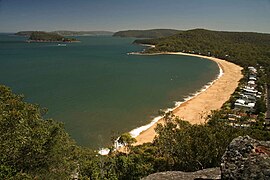Pearl Beach, New South Wales
|
Pearl Beach Central Coast, New South Wales |
|||||||||||||||
|---|---|---|---|---|---|---|---|---|---|---|---|---|---|---|---|

Pearl Beach from Mount Ettalong, showing nearby Lion Island (New South Wales) and Pittwater in the distance
|
|||||||||||||||
| Population | 513 (2011 census) | ||||||||||||||
| • Density | 428/km2 (1,110/sq mi) | ||||||||||||||
| Postcode(s) | 2256 | ||||||||||||||
| Area | 1.2 km2 (0.5 sq mi) | ||||||||||||||
| Location | |||||||||||||||
| LGA(s) | Central Coast Council | ||||||||||||||
| Parish | Patonga | ||||||||||||||
| State electorate(s) | Gosford | ||||||||||||||
| Federal Division(s) | Robertson | ||||||||||||||
|
|||||||||||||||
Pearl Beach is a suburb of Central Coast Council on the Central Coast of New South Wales, Australia. Pearl Beach was assigned 'suburb' status by the Geographical Names Board of NSW on 25 October 1991.
Pearl Beach has a rich Indigenous history that is largely ignored by historical markers which have been erected in the community to commemorate visits by white settlers.
On 2 March 1788 Captain Arthur Phillip sailed north from Sydney Cove, Port Jackson, to the inlet described by Captain James Cook in 1770 as a "broken land" (id est Broken Bay). As entered in their journals:
Located south of Umina Beach, being separated from it by a ridge upon which sits Mount Ettalong at a height of 56 metres (184 ft). It is bounded on the west and south by Brisbane Water National Park, and on the east by Broken Bay. Green Point, with Paul Landa Reserve, adjoins the southern end of the beach. The bay provides an example of a logarithmic spiral beach.
The south end of the beach is placid, sheltered by a rocky point and Lion Island and is favoured by most visitors as a swimming spot. The north end of the beach is known for rough surf and is unofficially called "the dumpers". The dumpers, excluding the roughest waves at the far north end of the beach, are a popular bodysurfing spot for strong, confident swimmers, except during particularly rough surf or at king tide. Swimmers risk getting violently pounded onto the sand by a wave, or "chundered" (usually kayaking terminology) by waves dumping into a deep trench along the shoreline, but can generally avoid getting chundered by moving towards dry land or ducking under the break of the wave and swimming back to shore in smaller waves.
In 2014, five-year-old Chayce Kofe drowned after a wave swept him off the shore by a large wave. Gosford City Council continues to oppose danger signs despite calls from the local Member Kathy Smith to erect them.
...
Wikipedia
